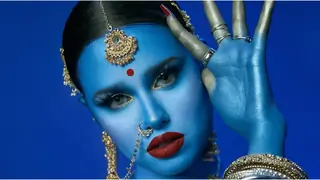Review: 'Maharaj' is a bold & well-intended story bought to life by Junaid, Sharvari & Jaideep's strong act
"Maharaj" is a bold and well-intentioned endeavor by Siddharth P Malhotra. The story is compelling and necessary, brought to life by strong performances.
Published: Friday,Jun 21, 2024 15:28 PM GMT-06:00

'Dharam Guru ke sirf naam badlenge, kisse wahi rahenge'- This phrase is what sums up the essence of the film 'Maharaj'. One needs genuine guts and courage in India to pick up a subject like this and make a film on it. As we already saw how the release of the film was kept on stay, involving legal battles and now that all seems clear, the film is set to be premiered on Netflix, marking Aamir Khan's son Junaid Khan's debut in this industry.
Plot and Progression

Directed by Siddharth P Malhotra, 'Maharaj' revolves around the Maharaj Libel Case of 1862 in the then Bombay Supreme Court. The story centres on the efforts of real-life journalist Karsandas Mulji (played by Junaid Khan) to expose the alleged sexual misconduct of religious leader Jadunathji Brijratanji Maharaj (portrayed by Jaideep Ahlawat). The screenplay, crafted by writers Sneha Desai and Vipul Mehta, is tightly written with dialogues that resonate and moments that linger long after the credits roll.
Set in mid-19th century Bombay, the film introduces us to Karsandas, a liberal-minded young man, who questions societal norms from a young age. As he grows up, he moves to Bombay and becomes a journalist. Upon discovering the wrongful practices of the Maharaj, also known as JJ, and experiencing a personal loss, Karsandas becomes determined to expose the religious leader's exploitation of followers, particularly young girls and women, under the guise of 'Charanseva.'
The movie tackles significant issues from the 1860s, focusing on the leaders of the Pushitmarg sect. However, the first hour feels slow, with excessive dialogue that tests the viewer's patience as they wait for the inevitable clash. The second hour, however, delivers the intense courtroom drama that the audience anticipates, featuring powerful performances and statements by Junaid Khan as Karsandas Mulji.
Packaging and Execution

Addressing such a sensitive topic on the big screen is no easy feat. The controversies and release delays highlight the risks involved. Despite some narrative distractions, the last 30 minutes are impactful, highlighting the core issues and leaving a lasting impression. The themes of the film are relevant to modern times, emphasizing the importance of challenging wrongful practices and blind faith.
The cinematography by Rajeev Ravi and the production design by Subrata Chakraborty and Amit Ray add depth to the film, effectively recreating the mid-19th century Bombay. The setting and characters are well-established, though the dialogues in the first half feel predictable. The second half, however, improves upon the clunky intro and first meetings between several characters, delivering a more engaging experience. Not only that, but we get to see a lot of Gujarati actors making small appearances, coming in as Easter eggs for those who have followed the films and plays closely.
Jaideep Ahlawat Vs Junaid Khan

Junaid Khan steps into the spotlight with a layered and meaty role. Though some may feel flaws in his accent or Karsan Das's overall packaging, he carries the weight of the narrative with a mix of intensity and subtlety. His portrayal shows a depth of understanding for his character's motivations and struggles, particularly during the court scenes, where he delivers remarkable lines with conviction.
Jaideep Ahlawat, as JJ, is the typical Godsman but not someone who sells on his words, but rather his expressions. His face and that smirk do the talking, and that constant feeling of pride in his eyes is enough to tell you what he can do as an actor. His portrayal makes you feel irked, and that's what makes him what he is. Kudos to Jaideep for convincingly playing such an unlikeable character.
Sharvari is the star

While Shalini Pandey is said to be the main actress, her role feels as an extended cameo. She has a good chemistry with Junaid and gives an earnest performance. But hands down, Sharvari Wagh steals the show here. The moment she enters the screen, she brings along a fresh wave of energy, vibrancy and cheer. As Viraj she holds the story and the 'entertainment' element of the film and to her credit does a mind blowing job. With the perfect accent, her sometimes annoying but well-intended catchphrase, 'mama-masi nu farak che', and others give layers to her character.
The Verdict

Overall, "Maharaj" is a bold and well-intentioned endeavor by Siddharth P Malhotra. The story is compelling and necessary, brought to life by strong performances.
Rating
***1/2 (3.5/5) stars
Join Our WhatsApp Channel
Stay updated with the latest news, gossip, and hot discussions. Be a part of our WhatsApp family now!
Join NowYour reaction
 Nice
Nice Great
Great Loved
Loved LOL
LOL OMG
OMG Cry
Cry Fail
Fail






















2 Comments